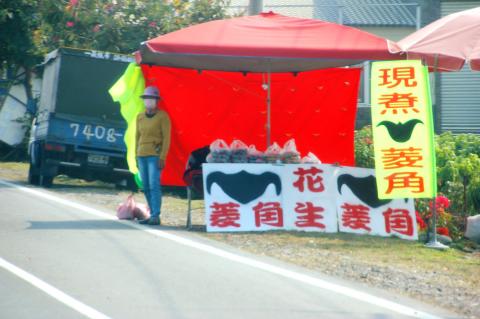A water caltrop vendor in Pingtung County has been receiving unwanted attention after a foreign tourist commented that the vendor appeared to be selling bats as food.
People are jumpy due to reports of the 2019 novel coronavirus, with rumors attributing its spread to Chinese eating bats and other wild animals, said the vendor, who asked to remain anonymous.
The rumors about his stall appeared to have started after the tourist mistook an image of a water caltrop on signage as being an image of a bat, he said.

Photo: Chen Yen-ting, Taipei Times
The fruit of the water caltrop curves downward on two sides, resembling the silhouette of a flying bat.
“I get shot even while lying down,” the vendor said, adding that it was not the first time that such confusion had occurred.
There are numerous sellers along 10km of Kanding Township’s (崁頂) Nanjhou Road, all of whom have signs featuring water caltrops, the vendor said.
Many foreign visitors are unfamiliar with the water caltrop — an aquatic plant native to temperate parts of Eurasia and Africa that has been cultivated in China and the Indian subcontinent.
In Taiwan, the plant is mostly grown in Tainan’s Guantian District (官田), but farmers set up shop in areas with many travelers, the vendor said, adding that the road was a great place for a stall because of its proximity to a highway that brings visitors from Taitung County and Pingtung’s Kenting National Park (墾丁國家公園).
“Now we can laugh about it, but every time there is news about bats, this type of confusion emerges,” the vendor said, adding that he hoped visitors would give the water caltrop a try.

TRAFFIC SAFETY RULES: A positive result in a drug test would result in a two-year license suspension for the driver and vehicle, and a fine of up to NT$180,000 The Ministry of Transportation and Communications is to authorize police to conduct roadside saliva tests by the end of the year to deter people from driving while under the influence of narcotics, it said yesterday. The ministry last month unveiled a draft of amended regulations governing traffic safety rules and penalties, which included provisions empowering police to conduct mandatory saliva tests on drivers. While currently rules authorize police to use oral fluid testing kits for signs of drug use, they do not establish penalties for noncompliance or operating procedures for officers to follow, the ministry said. The proposed changes to the regulations require

The Executive Yuan yesterday announced that registration for a one-time universal NT$10,000 cash handout to help people in Taiwan survive US tariffs and inflation would start on Nov. 5, with payouts available as early as Nov. 12. Who is eligible for the handout? Registered Taiwanese nationals are eligible, including those born in Taiwan before April 30 next year with a birth certificate. Non-registered nationals with residence permits, foreign permanent residents and foreign spouses of Taiwanese citizens with residence permits also qualify for the handouts. For people who meet the eligibility requirements, but passed away between yesterday and April 30 next year, surviving family members

Taipei, New Taipei City, Keelung and Taoyuan would issue a decision at 8pm on whether to cancel work and school tomorrow due to forecasted heavy rain, Keelung Mayor Hsieh Kuo-liang (謝國樑) said today. Hsieh told reporters that absent some pressing reason, the four northern cities would announce the decision jointly at 8pm. Keelung is expected to receive between 300mm and 490mm of rain in the period from 2pm today through 2pm tomorrow, Central Weather Administration data showed. Keelung City Government regulations stipulate that school and work can be canceled if rain totals in mountainous or low-elevation areas are forecast to exceed 350mm in

China Airlines Ltd (CAL) yesterday morning joined SkyTeam’s Aviation Challenge for the fourth time, operating a demonstration flight for “net zero carbon emissions” from Taiwan Taoyuan International Airport to Bangkok. The flight used sustainable aviation fuel (SAF) at a ratio of up to 40 percent, the highest proportion CAL has achieved to date, the nation’s largest carrier said. Since April, SAF has become available to Taiwanese international carriers at Taipei International Airport (Songshan airport), Kaohsiung International Airport and Taoyuan airport. In previous challenges, CAL operated “net zero carbon emission flights” to Singapore and Japan. At a ceremony at Taoyuan airport, China Airlines chief sustainability